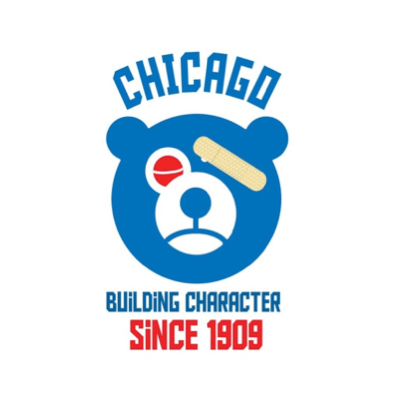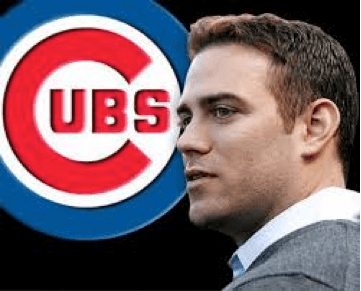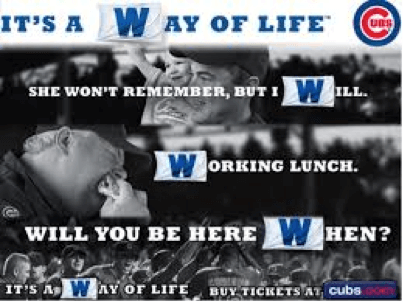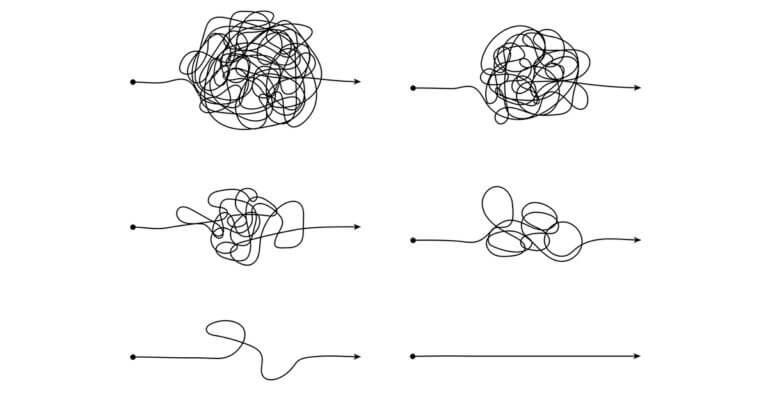October 4, 2016

Winning “The Cub Way”: It Takes an Organization
The Cubs just finished the 2016 regular season with 103 wins and baseball’s best record by a mile. They have spectacular pitching, powerhouse hitting and solid defense. Las Vegas odds-makers have established the Cubs as runaway favorites to win this year’s world series. The Cubs – baseball’s perennial losers! Chicago sports fans haven’t been this excited since Michael Jordan suited up for the Bulls.
The Cubs success story embodies more than great players. Since acquiring the team in 2009, owner Tom Rickets has systematically rebuilt the Cubs into a championship-caliber organization. A great back office enables front-line players to perform at their highest levels.
Like the Cubs, health company leaders must transform their organizations to prosper in a more competitive and consumer-oriented market environment. Winning in post-reform healthcare is a daunting challenge. The Cubs turnaround offers several lessons for managing organizational change.

Baseball’s Lovable Losers
Any team can have a bad century! The Chicago Cubs define futility. They haven’t won the World Series since 1908. They haven’t even played in a World Series since 1945.
Legendary columnist George Will is a life-long Cubs fan from downstate Illinois. Central Illinois fans split equally between the Cubs and the powerhouse St. Louis Cardinals.
According to Will, choosing between the Cubs and Cardinals changes lives. Cardinal fans are naturally optimistic, always see the glass as “half full” and have faith in the future. By contrast, Cub fans are paranoid, see danger lurking everywhere and distrust everyone.
Perhaps that explains Will’s own sour demeanor. He said this in a 1990 USA News interview, “All I remember about my wedding day in 1967 is that the Cubs lost a double-header.”
Despite the accumulated decades of frustration, Cub fans remain remarkably loyal. They fill Wrigley Field in good times and bad. “Wait until next year” has ground into their collective psyche. Will 2016 finally be their year?

“The Cub Way”[1]
In October 2011, Ricketts hired Theo Epstein to right the ship. As President of Baseball Operations, Epstein has engineered a complete makeover of Cubs baseball. After last-place finishes his first three years, the rebuilt Cubs emerged last year. They won 97 games and beat the hated Cardinals in the playoffs before losing to the New York Mets in the National League Championship Series.
This year’s team has built on last year’s success. Rickett’s believes Epstein is baseball’s best executive and just rewarded him with a 5-year extension. In typical fashion, Epstein told Ricketts he wasn’t leaving Chicago irrespective of his compensation. Good organizational karma starts at top and leads by example.
Only 42, Theo Epstein has already produced one miracle turnaround. As baseball’s youngest general manager, he overcame the “curse of the Bambino” in orchestrating Boston Red Sox World Series victories in 2004 and 2007.
Epstein joined a Cubs organization in disarray and transition. The team was terrible. A “me-first” player attitude dominated the dugout. Scouting and player development were broken. The facilities were crumbling – Wrigley Field had nets to catch falling concrete. A small front-office staff worked in trailers and processed group ticket sales with carbon paper. Performance reviews were non-existent.
Epstein immediately raised expectations and began preaching “The Cub Way”. Senior management set three goals: 1. Be a good neighbor; 2. Preserve historic Wrigley Field and 3. Win the World Series. Cub fans reacted cynically. They’d heard it all before. One graphic parodied Epstein’s new guidelines, suggesting managers can’t be morons and outfielders must catch better than bleacher fans.
During 2012 spring training, Epstein distributed massive staff manuals detailing every facet of “The Cub Way” doctrine – “from code of conduct to which foot to plant on the bag while making your turn around a base.”[2] For Epstein, “The Cub Way” is a “living, breathing thing”. Here’s how he described it in early 2012,
“The Cub Way” really boils down to the people. The players, obviously, but then all the scouts, all the people in the minor leagues, here in the big leagues. It’s more than words on a page. It comes down to how deep we dig to get connected to players, to teach the game the right way, how much we care, how committed we are, how we treat each other in the front office, the coaches, the plyers, how hard we work.”[3]
In other words, organizations, not players, win championships. In partnership with Crane Kenney, the Cubs’ President of Business Operations, Epstein began building the Cubs into a championship-caliber organization.

Action Steps
Clearly, the Cubs needed to overhaul both baseball and business operations. Epstein and Kenney attacked organizational revitalization with insightful vigor. Here’s what they did:
- Set Big Goals: top to bottom in both baseball and business operations, the Cubs have a unified, selfless commitment to winning a World Series.
- Built World-Class Facilities: the Cubs are undertaking a massive $575 million Wrigley Field renovation and building a trendy professional office building. They’ve already completed new training facilities in Mesa, Arizona and the Dominican Republic. Where appropriate, the Cubs use partnership arrangements to fund facility development costs and mitigate operating risks.
- Pursued Talent: the Cubs hired difference-makers to turbocharge organizational transformation. Sensing the team’s potential, Epstein convinced baseball’s best manager (Joe Maddon) and to join the Cubs in 2015. Kenney hired senior GE executive Bryan Robinson to run HR and a seasoned consumer goods executive (Alison Miller) to upgrade marketing.
- Rebuilt the Foundation: it took patience, persistence and new leadership to transform the Cubs underperforming farm system and business office. The emergence of young “home-grown” stars has driven the team’s on and off-field success. The business office has more than doubled and hired large numbers of recent college graduates. All perform in accordance with “The Cubs Way.”
- Empowered Specialists: just like the baseball team develops “specialists” to enhance performance. Former “generalists” now specialize in ticketing, customer service, sales and operations.
- Instituted Accountability and Professional Development: each member of the Cubs organization has firm goals tied to clear definitions of success. “The Cub Way” for assessing and enhancing personal performance is identical for athletes and professionals. Each person has clear development goals and a program for achieving them. The Cubs contract with Northwestern’s Kellogg School of Management to guide organizational learning and development.
- Aligned Baseball and Business Operations: aligned baseball and business operations are essential to achieving superior on-field performance. Managing Baseball and Business Offices “The Cub Way” helps achieve that objective, but it’s not enough. Senior baseball and business executives participate in multi-day Kellogg retreats to assess progress and fine-tune strategies.
Lessons for Health Companies
While baseball is figuratively life or death for diehard fans, healthcare delivery can literally be a life or death experience. Too many people die unnecessarily in hospitals. Too many Americans suffer from debilitating chronic disease. As the healthcare industry transitions toward value-based delivery and population health, health systems can learn from other industries. “The Cub Way” offers the following insights:
- Pick the Right, Big Goals: in healthcare delivery, achieving the best outcomes at the lowest prices is the obvious goal. Better population health is dependent on more effective monitoring and interventions.
- Act with Both Patience and Urgency: organizational transformation cannot happen overnight, but health company executives must lead with a sense of urgency. Creating selfless, team-oriented cultures that pursue constant performance improvement can be the difference between success and failure.
- Align Business Operations with Medical Operations: too often medical and business operations fail to harmonize. The two must be as one. Healthcare mirrors baseball in that front-line caregivers can only excel when supported by talented and aligned business professionals.
- Specialize: find and cultivate the professional talent needed to differentiate organizational performance. Steal skilled people from other industries. Build a great base of young professionals. As healthcare goes retail, health companies must have professionals with deep consumer experience shaping marketing and strategy.
- Develop Talent: find professional schools like Kellogg or build internal “universities” to guide organizational learning. Take advantage of advanced systems for assessing performance. Help professionals become exceptional team players.
- Appropriate Facilities: align facility investment with forward-looking market trends. Emphasize customer convenience and operating efficiency. Run facilities harder to reduce per-unit operating costs. Reduce reliance on and investment in high-cost facilities requiring premium reimbursement for financial sustainability. Consider shifting ownership and operating risks to third parties.
- Create “The Way”: professionals thrive in business cultures that give them autonomy, encourage skill mastery and provide a deep sense of purpose. Articulating, reinforcing and living organization-wide values differentiates winning companies.
- Never Stop Improving: practice constant performance improvement. Strive to reduce variation, eliminate waste and improve quality organization-wide in all functional areas.

It Takes an Organization
There are many excuses Cubs fans have for the team’s abysmal performance: the Billy Goat curse of 1945; the black cat in 1969 and the Bartman incident in 2003.
While entertaining, folk lore obscures the larger truth. The Cubs have had good baseball teams, but they’ve never built a great organization. The hyper-competitive world of professional sports requires great organizations to win championships.
The strategic, operational and cultural challenges in post-reform healthcare are enormous. Winning health systems must create championship-caliber organizations to meet them. All employees must perform at high levels to ensure success.
Only great organizations can develop the capabilities necessary to deliver high-value services tailored to customer needs. Many, perhaps most, health companies must step-up their games or lose market relevance. The future is very bright for those companies that rise to the challenge.
[1]General Source: Talent Management, ““The Cubs Way”” , Frank Kalman, October 2, 2015
[1] ESPN, “New ‘Cub Way’ beginning in Arizona”, Gene Wojciechowski, February 21, 2012
[1] Chicago Tribune, Cubs’ Theo Epstein Supports Joe Madden’s Stand Against Cardinals Way, Paul Sullivan, September 21, 2015





